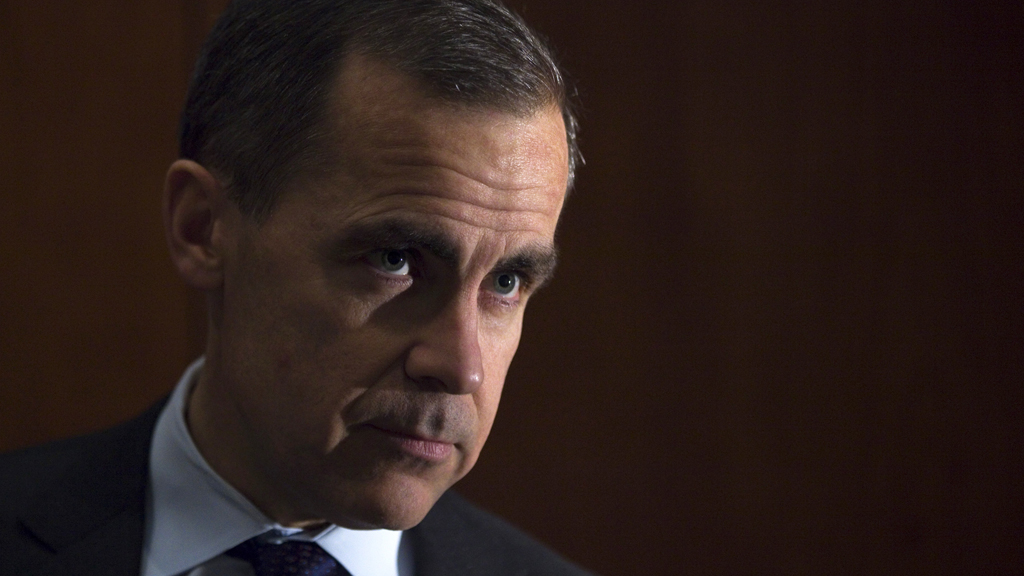Can Carney wield his wand to heal UK’s wounded economy?
 Siobhan Kennedy
Washington Correspondent
Siobhan Kennedy
Washington Correspondent
Great things are expected of Canada’s Mark Carney, the new Bank of England governor. But questions are now being asked about the health of the economy he leaves behind.
He’s clean-cut, dynamic, dashing, and with just the right amount of winning smile, writes Channel 4 News Business Correspondent Siobhan Kennedy. More central casting than central banker. The most powerful figure in finance you’ve probably never heard of – yet in a few months’ time Mark Carney’s decisions will shape the lives of everyone in Britain.
The 47-year-old governor of the Bank of Canada is the first-ever foreigner to become governor of the Bank of England in its 318-year history.
Not bad for a boy from Fort Smith, in Canada’s Northwest Territories. But he’s come a long way since then. Witness Mr Osborne’s statement about him when he announced Mr Carney’s appointment. There was no-one better than Mr Carney in the world for the job, he said.
But it’s not just the chancellor. Everyone, from all sides of the political spectrum and all walks of financial life, seems to agree he’s the best man for the job.
Up to his neck in it
So what did Mr Carney do that’s elevated him to one of the most respected economists the world over?
Ottawa isn’t exactly known as a hotbed of monetary decision-making, but Mr Carney’s appointment coincided with the onset of the financial crisis in 2008 – so he was right up to his neck in it from day one.
But for a Harvard- and Oxford-educated economist, with a 13-year grounding at Goldman Sachs, Mr Carney relished the opportunity to meet the challenge head-on.
Canada’s banks weren’t in anything like the same trouble as those in the US or the UK, but Canada’s close proximity to the America meant he had to act fast to avoid the risk of contagion.
Within a month of taking the job, he performed what many now describe as his masterstroke. He made the surprise and controversial decision to slash interest rates to 0.5 per cent, and he kept them there. The aim was to get Canadians to spend, to boost the economy and save it from the ravages of the financial crisis.
The plan worked. The Canadian economy fared much better than most others during the storm that ensued, and Mr Carney was elevated to hero status the world over.
Legacy questions
But as he prepares to leave his top job there, questions are now being asked about his legacy and the health of the economy he’ll leave behind.
Right now, Canada is still growing and employment is strong. But there are niggling concerns that the economy is beginning to falter as Canadians have heaped on billions of dollars worth of debt.
Nowhere is that more evident than in the property sector. As Canadians went on a spending spree, house prices have been pushed up, fuelling fears of a housing bubble. Now many say that bubble is ready to burst.
Prices in some streets in Ottawa have more than doubled in the past four years – and the situation is worse in the big cities of Toronto and Vancouver. It’s a problem that worries Mr Carney himself. Five years on from his big decision to slash rates, Canadians have racked up huge amounts of debt.

Mr Carney himself is constantly warning about the dangers of debt, and encouraging financial prudence. But it seems not everyone is listening.
Credit counsellors tell us they’re working round the clock to help indebted families. And US firms are even coming across the border to help meet demand.
And here’s a shocking statistic: the amount Canadians have borrowed compared to their income stands at a staggering 166 per cent. That’s even higher than the US figure of 160 per cent – just before its housing bubble burst.
So Canadians know they’re skating on thin ice. But while there are signs household debt is coming down, one influential economist we spoke to, Don Drummond, said Mr Carney was being hypocritical. You can’t simultaneously warn about debt yet at the same time keep rates low hoping people will spend, he says.
Little room for manoeuvre
It’s a fact not lost on Moody’s, the credit ratings agency. Last week, it cut the ratings of Canada’s six largest banks, citing concerns about their ability to withstand rising consumer debt and a potential housing bubble.
Mr Carney could slow things down by increasing interest rates, but that’s a vicious circle as it would likely inflate the Canadian dollar and – as a knock-on effect – hurt exports, a key element of Canada’s strength. What’s more, Mr Carney’s remit, just like Mervyn King’s here in the UK, is to keep inflation to a 2 per cent target. That’s his primary objective.
So what can we learn from Mr Carney’s past about what he might do here, when he takes up his position as governor in the summer? If his moves in Canada show us anything, it is that he was prepared to make bold decisions early on to keep the economy on track and steer it through the worst of the financial crisis – even though it’s meant storing up some pain for later. Just how much pain we have yet to see.
The question now is whether he’ll take similar, radical action here. He has already hinted he might, and certainly with all the hype, there’s an expectation he will wave his magic wand and heal Britain’s wounded economy. But with growth here flatlining at best, some say he has very little room for manoeuvre.